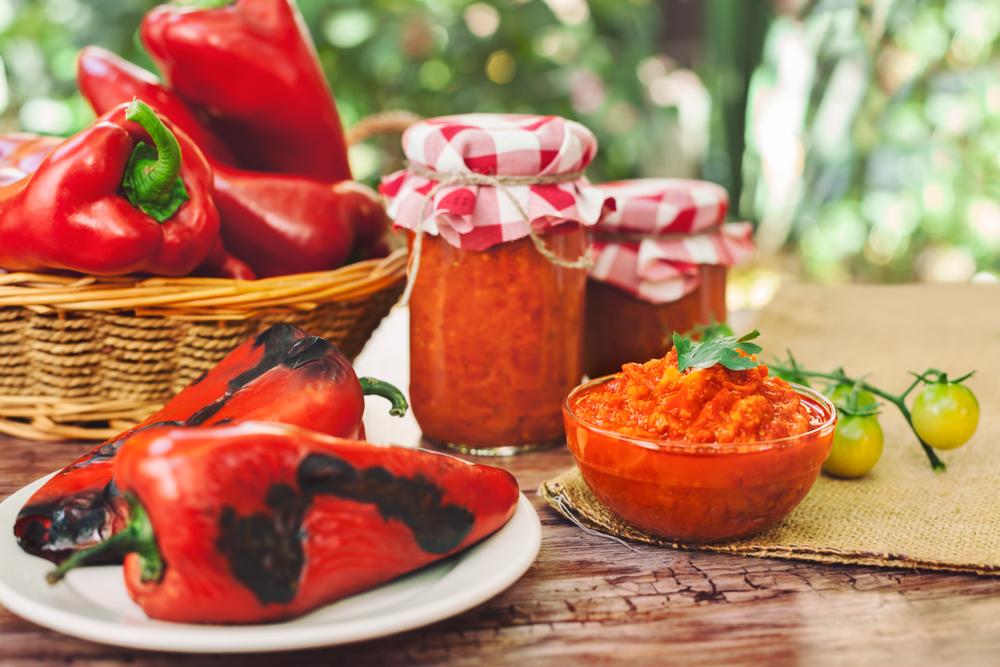Find out all about the spread that the Balkans consider as their culinary treasure!

Not a single person grew up in former Yugoslavia without tasting ajvar. This simple and delicious culinary side dish has become part of the Balkan tradition, and many even call it Balkan caviar. Read on to get to know this delicacy better, learn how to do it, and maybe even try to make your own!
A little bit of history
Its name comes from the Turkish word Havyar, which means caviar. Although many countries are still competing over whose ajvar is best, Serbia is considered the originator of this delicacy. People ate it with meat and vegetable dishes of the past, but it also goes great with many of today’s recipes. Knowledge and skill of making ajvar was passed down from generation to generation and has become a tradition of many families across the Balkans. It’s mainly made and stored for winter months, but today (fortunately for its many fans!), it’s available throughout the year.
Making a homemade one
Homemade ajvar is made from red peppers (horn pepper or bell pepper) that are first roasted and then cooked. After the roasting, the peppers are seeded and skinned. Making homemade ajvar is quite a demanding job that takes a long time, especially if you want to prepare a large quantity. It takes a long time to peel the roasted peppers, followed by cooking with other ingredients. Purchased ajvar differs mainly from homemade ajvar because of the preparation method and the ingredients used. Because of that, it’s often lower quality than homemade ones!

Family tradition
Making ajvar has become a tradition among many families. One day a year, mainly on the weekends, family members get together and start whipping up their favorite delicacy. Everyone has a role: the most experienced family members cut and bake, and the youngest ones help with mixing. This day is the perfect opportunity to hang out and enjoy yourself with your family. When the ajvar is cooked, all family members prepare jars to store it. After that, they just have to wait for the first grand opening!
Ajvar is mainly made in the fall, during the paprika season. Large quantities are stored in jars, so most families have their ajvar all winter.

What are ćevapi without ajvar?
One of the most famous types of meat in the Balkans is certainly ćevapi. And every ćevapi lover knows the four main ingredients for happiness are: homemade bun, ćevapi, onions, and ajvar! This dish is known throughout the Balkans and enjoyed by all meat lovers. Of course, ajvar is the magical ingredient that makes everything juicy and spicy!

Tips for the best homemade ajvar
- The first and most important thing is to get home-grown vegetables! If you don’t have your garden or friends who have a garden, you can always visit the local market and buy home-grown vegetables. You will need horn peppers or bell peppers, eggplant, sunflower oil, vinegar, salt, and hot peppers. You can get almost all of these groceries at the local market, and trust us — it pays off!
- Get one big pot. Cooking in smaller pots makes the job harder, creates more mess, and worst of all, you have to season each pot separately. Put all the necessary ingredients in one big pot and make your favorite side dish in one place!
- If you have family members (maybe children) who are not crazy about ajvar like you are, here are some ideas! Make a quick and easy hummus and jazz it up with two tablespoons of homemade ajvar that you put on top. You can also mix ajvar with many other ingredients, one of which is yogurt. Maybe your kids like the milder version of your ajvar. Give it a try!
A short trip for Balkan caviar
If you are unable, don’t have the time or simply don’t feel like making homemade ajvar, you can always buy it in stores. Ajvar in jars is available in all stores across the Balkans, so you don’t have to worry about going to a mall or specialty store on your own. The selection of ajvar is huge because there are many producers from several countries. Some can compete with the homemade ajvar, while some still have a “cheaper” taste. Therefore, explore the offer of the place where you are to enjoy the best possible Balkan caviar. Even better — you can also explore the offer of smaller local producers and buy homemade ajvar directly from them. And another great thing about ajvar is that you can use it as an ingredient for cooking. For example, you can put it in pasta sauces, in risotto, or use it as a chicken filling!

In conclusion, if you ever visit one of the countries in the Balkan region, you should definitely try ajvar in some way. You can eat it with a spoon, hummus, vegetable, in a salad or as most Balkans would recommend — with ćevapi. Of course, if you get the chance to take part in making this dish, give it a try! Also, a jar of homemade ajvar is a perfect souvenir that you can give to someone when you return home, especially if you live in parts of the world where you don’t often have the opportunity to enjoy Balkan cuisine. And another proof of how much the Balkans adore this delicacy is the fact that there’s even an official competition for the best homemade ajvar in some countries. We know for sure that it’s very hard, yet nice to be part of the jury and enjoy the various variants of this traditional Balkan treasure!